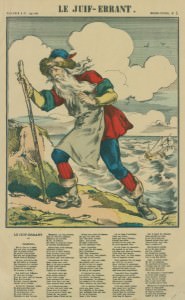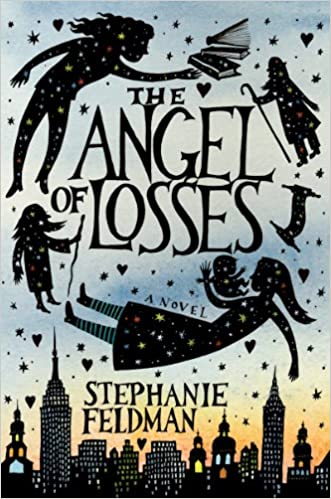The Angel of Losses by Stephanie Feldman
It’s funny how books speak to you.
As a professional journalist and former editorial illustrator, I know that you can’t judge a book by its cover, but the gorgeous Chagallesque fantasy on the cover of The Angel of Losses: A Novel by Stephanie Feldman (Harper-Collins, July 29) drew me right in. Happily, the book matches it’s dreamy, lyrical cover as it follows doctoral student Marjorie Burke’s passionate and even obsessive journey behind the sweetened surface of her beloved grandfather’s fairy tales.
[giveaway giveaway_id=1589 side=”left”]Marjorie is still grieving about losing her grandfather Eli and the growing distance between her and her sister Holly, who has become an entirely new person since her marriage to the strangely intense and ultra-Orthodox Nathan. She tries to lose herself in her research on the Wandering Jew for her Ph.D. thesis, but begins to see strange parallels between her discoveries and the life of her grandfather. Could the White Magician of his stories be the White Rebbe of Jewish legend? What does the Wandering Jew have to do with him and a lost angel grieving for heaven? And why does that strange old man, who gave her the mysterious amulet, know the whereabouts of Eli’s destroyed journals—which may be the key to saving her infant nephew?
Could the White Magician of his stories be the White Rebbe of Jewish legend? What does the Wandering Jew have to do with him and a lost angel grieving for heaven? And why does that strange old man, who gave her the mysterious amulet, know the whereabouts of Eli’s destroyed journals—which may be the key to saving her infant nephew?
What Marjorie discovers goes far deeper than buried family secrets, sibling estrangement and the passion of a scholar for the truth. It is a dance on the razor’s edge of Jewish mysticism and folklore that will create a modern supernatural heroine steeped in Jewish history.
We talked with Stephanie Feldman about her novel, her inspiration and the future of the Burke sisters.
BOOKTRIB: What inspired you to write about the intersection between Jewish mysticism and folklore?
STEPHANIE FELDMAN: I started with folklore, where I discovered multiple variations of a holy man who attempts to force the coming of the Messiah, and with the Messiah, the end of this world and the arrival of Paradise. I found this recurring tale fascinating—the character’s faith and hubris, his adventures and mystical knowledge. I wanted to write more about this story, so I began investigating religious ideas about our fallen world and the apocalypse. There are many Jewish mystics and leaders who appear in both historical chronicles and fanciful legends.
BT: How much research did the novel require?
SF: I read a lot of books about Jewish folklore and mysticism; European history; medieval travel narratives; and contemporary religious divides. When I began writing, though, I put a lot of that research aside. The characters and the central mythology—the battle between the White Rebbe, a wizard, and the Angel of Losses, who granted him his power—are mostly invented, though the spirit of the tale, and many details, come from other legends.
BT: Was any of your novel inspired by the study of Kabala and if so, in what way?
SF: I didn’t start with Kabala, but many of the historical figures I liked were involved in its study. Nathan and the Berukhim Penitents practice mysticism, and I took their rituals from old Kabalistic customs, especially angel magic: using sacred names to summon and control angels.
Kabala’s major philosophical tenet informs the book, too. Like other religious people of all denominations, Jewish mystics believe we live in a fallen world. They’re motivated by the desire to repair the world—for kabbalists, that means recovering light that was lost during the expulsion from Eden—and thus hasten the redemption.
BT: Were any of the characters based on your own family or family history?
SF: No, not directly. I have a younger sister, so people who know me immediately want to know if the sisters in the book, Marjorie and Holly, are based on us. They’re not! My sister and I have the same interests and lifestyle, with no major feuds worthy of a novel.
I don’t intentionally model my characters after anyone. When I write, the characters seem to evolve at their own accord, and their influences remain mostly subconscious for me. It’s only when I’m done that I can look back and try to guess where they come from, and I often find aspects of my own personality, struggles I’m having or choices I need to explore.
BT: What made you interested in the myth of the Wandering Jew?
SF: I’ve always loved scary stories, so I was pretty excited when realized I could study them in school—at least older, “classic” stories like Frankenstein and Dracula. The Wandering Jew popped up in a number of books I studied in college, and I was surprised to learn that, despite his name, there’s nothing Jewish about his origin—he’s a European legend, with “Jew” indicating rejection of Christ.
I’m Jewish myself, so I was interested in untangling the origins and evolution of that myth. But, as a reader and writer, I was just as intrigued by the character itself: a mysterious, immortal stranger, occasionally with magical power, who carries an eternal debt.
BT: Who inspired The White Rebbe?
SF: The White Rebbe is my own take on the Wandering Jew, so I’d say he’s equally inspired by Jewish legends like Joseph della Reina, the “mad rabbi,” and Christian-European characters like Faust and the Ancient Mariner. The name comes from a Polish legend about a man who discovers a secret path to the holy land. I was only able to find a brief mention of the myth, which at first was frustrating—and later, was exciting. It allowed me to take the name and create my own story.
BT: How long did you work on the novel?
SF: It’s been about five years between starting the first draft and publication day. Sometimes that seems like a very long time, sometimes not. But either way, I’m so excited to finally share the novel with readers.
BT: Will we see the Burke sisters again?
SF: I don’t know if I’ll come back to those characters again. When I first finished the book I thought that was it, but now I’m not so sure. I wonder what’s going to become of them.
BT: What is your next project?
SF: I’m a little superstitious about talking about a project before it’s finished, but I can tell you it’s another story with history and magic, as well as a character study of an ambitious, sentimental, questionably-sane poet and would-be prophet.
Buy this Book!
Amazon





